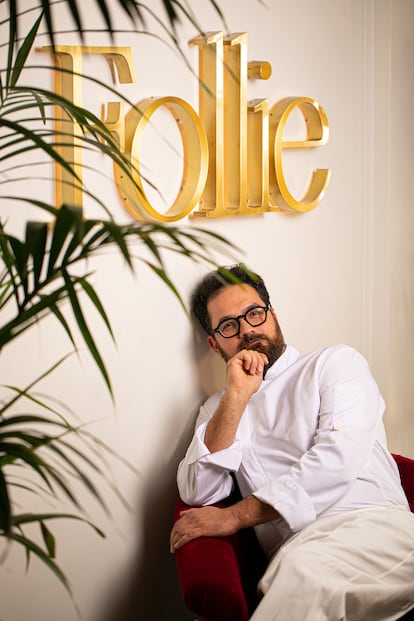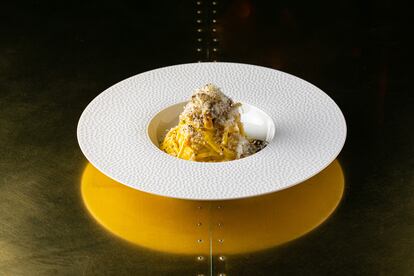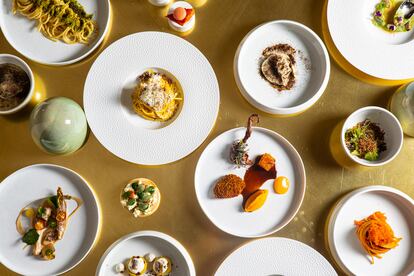Luciano Monosilio, ‘The King of Carbonara’: ‘Pasta is the mamma of all Italians’
For his new restaurant in Rome, the Michelin-starred chef has created a menu that helps him remember his beginnings. His signature dish: spaghetti alla carbonara

Luciano Monosilio — nicknamed “The King of Carbonara” — has made the ancient dish one of the emblems of his kitchen. While he is one of the most popular chefs in the world of contemporary Roman gastronomy, his penchant for tradition is unparalleled.
In the old days, residents of the mountain towns of Abruzzo — a sparsely populated region of southern Italy — used to fill their pots with spaghetti, pecorino cheese, eggs, pork and black pepper. For these humble people — many of whom made their living by manufacturing charcoal — these ingredients were easy to purchase and preserve, to better withstand the long working days and the cold winters.
Monosilio knows how to reinterpret the classics. He’s managed to cross Italy’s regional borders and bring his carbonara — on which a Michelin star shines — from popular gastronomy to haute cuisine circles.
“I cook in Rome — I couldn’t not make such a traditional dish. But my carbonara isn’t a traditional carbonara… it is mine, period,” he laughs.
The King defends his innovation of a dish that is so traditional, popular and deeply-rooted. It’s not easy to alter such a symbolic meal.
“It has evolved a lot over time, the producers are getting better and better. A great chef once said that a menu of 10 dishes without pasta is just a menu of 10 starters.”
Monosilio rejects criticism from purists — something that every cook who experiments with a dish so characteristic of Italian culture has to face.
“It’s like when you see a great painting and someone says: ‘I could do that better.’ Yes, but you haven’t done it,” he jokes.
The chef confesses to being a “pasta madman.”
“Pasta is the mamma of all Italians. We are born eating pasta. An Italian eats pasta at least once or twice a week. We’re born with that culture.” He enthusiastically tells EL PAÍS that he soon plans to open a 5,000-square-foot pasta factory.
“I dedicate so much of my time to pasta because it’s a foundation. For us, it’s part of everyday life.”
Monosilio defines his kitchen as a kitchen of instinct — he moves on impulse. He is a pupil of the great Fulvio Pierangelini — who won two Michelin stars — and Mauro Uliassi, a chef known for his fish-based recipes, who won three. He also spent a season working for the famous Enrico Crippa (three Michelin stars) and in Cape Town, South Africa, where he now has his own pasta bar.
When he looks back at all his apprenticeships, Monosilio recalls the innocence and clumsiness that marks a beginner.
“In 2009 — when I entered Uliassi’s restaurant — there was none of the technology that exists today. The phones didn’t have internet. When I started to work, I didn’t know who Mauro Uliassi was or what he looked like. There was another cook there also named Mauro… for three days, I thought he was Uliassi!” It was actually Mauro Paolini, another renowned chef who forged his career with the seafood master.

The culmination of Luciano Monosilio’s career came when he won a Michelin star alongside chef Alessandro Pipero in 2012, when he was only 27-years-old. That same year, Monosilio was named an Emerging Chef by Gambero Rosso, an influential Italian publication focused on gastronomy and wine.
“The Michelin star has been an advantage… it gave me the chance to do other things, to be able to stop what I was doing. When they gave it to me, I said that I would stop working for others, but it came too soon, and I had to continue working. But it still helped me a lot in my career.”
In 2018, he decided to take a break from haute cuisine and start his own restaurant, located in the heart of Rome, the eternal city. He would focus on his favorite ingredient — pasta — and make it from scratch in the basement.
Five years later, after international success, he has embarked on another adventure, returning to his signature cuisine as the head chef at Follie, the new restaurant at the Gran Meliá Villa Agrippina hotel. Nestled in the summit of Gianicolo, it’s housed in the villa that once belonged to the mother of Emperor Nero.
For the menu, he explains, he has chosen some of the historical dishes of his career, to remember his beginnings. There is smoked lamb with raspberries and oyster sauce; beef with lettuce and black truffle; a pizza margherita, which is actually ravioli filled with tomato sauce… although it has the flavor of classic pizza. More daring, yet traditional dishes include raw goose meat with apples, or raspberry vinegar and lamb offal, prepared by Monosilio in a laborious process: the lamb is kept in brine for five days, followed by a 12-hour-long drying process.
“The first menu was born with the idea of returning to an old path that had been abandoned,” he confesses. “The mission is to express the local culture through food.”
He points out that he’s managed to free himself from the stress of his early years in the kitchen.
“I want to do things well with more calm, with a serenity that allows me to create, grow…”
With this new project, he feels free to experiment with vegetables, fish and fermentations, along with a wide variety of local and seasonal products.

From childhood, Monosilio always knew that, when he grew up, he wanted to be a cook: “I will do the best I can,” he told himself.
Throughout his career, he hasn’t been inspired by anyone — he goes it alone.
“I’ve had points of reference, with the great chefs with whom I’ve worked. They taught me something and have given me direction… but I don’t imitate anyone. I don’t want to be like them. I am always Luciano and I will always do what I like.”
He pauses for a moment. “What is good for me, is maybe not good for others. You can never become someone else — you must always be yourself.”
When it’s time to start the day, Luciano Monosilio chooses tradition over innovation. He likes to start the day with a porchetta sandwich — a typical Italian dish consisting of boneless pork, roasted in the oven and seasoned with various herbs. When he mentions it, he waves his hand in that classic gesture that Italians make to express that a meal is delicious.
Sign up for our weekly newsletter to get more English-language news coverage from EL PAÍS USA Edition
Tu suscripción se está usando en otro dispositivo
¿Quieres añadir otro usuario a tu suscripción?
Si continúas leyendo en este dispositivo, no se podrá leer en el otro.
FlechaTu suscripción se está usando en otro dispositivo y solo puedes acceder a EL PAÍS desde un dispositivo a la vez.
Si quieres compartir tu cuenta, cambia tu suscripción a la modalidad Premium, así podrás añadir otro usuario. Cada uno accederá con su propia cuenta de email, lo que os permitirá personalizar vuestra experiencia en EL PAÍS.
¿Tienes una suscripción de empresa? Accede aquí para contratar más cuentas.
En el caso de no saber quién está usando tu cuenta, te recomendamos cambiar tu contraseña aquí.
Si decides continuar compartiendo tu cuenta, este mensaje se mostrará en tu dispositivo y en el de la otra persona que está usando tu cuenta de forma indefinida, afectando a tu experiencia de lectura. Puedes consultar aquí los términos y condiciones de la suscripción digital.









































